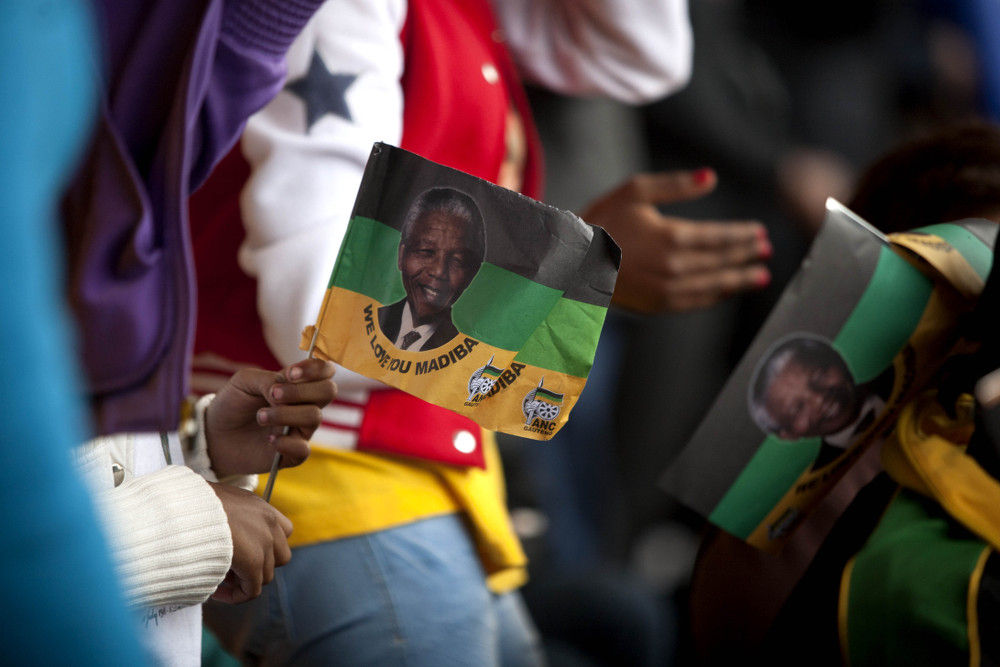
The world pays tribute to Mandela (slideshow)
As South Africans come to terms with the loss of former president Nelson Mandela, the rest of the world bids farewell to Madiba.

Pimples: Saving Madiba's rabbit (video)
Gwede, Mac and Blade try their best to stop the rabbit from whispering in Mandela's ear. But the elusive animal has some tricks up its sleeve.

Zapiro's best Madiba cartoons (slideshow)
From his toughest moments to his most triumphant, Madiba has been an inspiration. Here are some of our favourite Zapiro cartoons about him from 1994 to 2013.

Mandela: SA's greatest son laid to rest (slideshow)
The world watched as Nelson Mandela was finally laid to rest in his hometown of Qunu following a dignified and moving funeral ceremony on Sunday.
On Tuesday, the people in FNB Stadium did not get to say goodbye to Nelson Mandela. You could see it in the empty chairs (a failure of public transport and the fact that it was a normal work day for the majority of Gautengers); you could see it in the restless crowd that wanted to sing and dance; you could see it in the heckling of President Jacob Zuma.
The government laid out an event that it thought was appropriate for the passing of a beloved statesman and a national hero: gravitas, world leaders, speeches, the odd musical interlude. But this programme shows they forgot what South Africans want and need: catharsis, the chance to celebrate a man who changed their lives and gave them freedom.
We do it loudly because that's how we show emotion; we dance, we sing. In the last five days at the homage sites around the country, it has been common to hear a foreign broadcaster or journalist ask: "I thought everyone was mourning. Why are they singing?"

At the FNB Stadium, no matter how hard it tried to drive the event, the crowd became the backdrop of an event aimed at television cameras, speeches by people they had never heard of (speeches the crowds could not hear because of a dubious sound system), so that South Africans could hear how much other people appreciated Madiba.
At 5am, memorial goers were awaiting the first train from Park Station to FNB Stadium. People were not tired; they were exhilarated, and the ripe-smelling quay echoed with the sounds of Shosholoza and Nelson Mandela tribute songs. This vibe and atmosphere continued throughout the morning, through the cold rainy weather, as people nipped to the sheltered back rows in the stadium.

Where was the singing
Proceedings – meant to begin at 11am – ran late (this time because Western dignitaries rather than South Africans were late), but the good humour continued. Until the national anthem.
The sound system turned a full orchestra into a reedy, limp-handshake of melody, so much so that the first part of it was over before the crowds realised that it began. This was followed by speeches, many speeches. Where was the singing and joy?

Memorial-goers were treated like children – effectively told to sit down and listen while important people talk – and we are not a people to take that lightly, or sitting down for that matter.
Where was the emotion from the speakers? When Zuma delivered the keynote address, he was wooden and didn't lift his eyes from his speech (although he may have felt the need to soldier on in light of the hostile and restless crowd). But this is a man renowned for his ability to address the public. Why did he not speak from the heart about a man who he knew?

(Pictures by Oupa Nkosi, M&G)
On the streets
Where were the children? Mandela loved children, enjoyed being around them and took delight in their presence. But young South Africans did not feature on the programme.
On Tuesday night on Vilakazi Street, a marching band was playing while mourners continued to pay their respects to Mandela with flowers and song. The same thing happened in Johannesburg, Durban, Cape Town, Qunu, and the rest of the country.
The love, respect and gratitude South Africans have for their Tata are playing out in the streets, not in scripted events.


